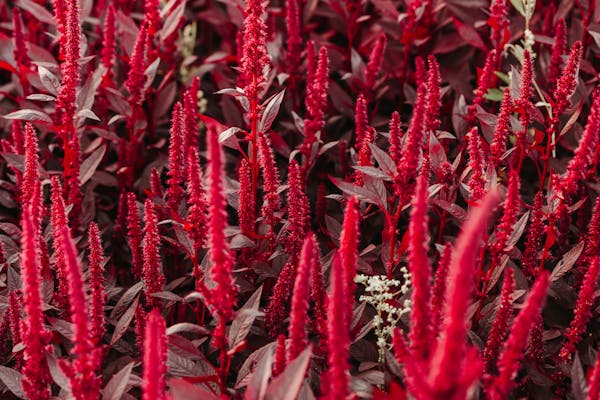10 Surprising Sources of Plant-Based Protein
Introduction
We know that when most people think of plant-based protein, their minds immediately jump to tofu and beans. And while these are certainly great options, there are actually many more plant-based protein sources out there that you may not have considered.
In this article, we're going to explore some of the lesser-known sources of plant-based protein that can help you mix up your meals and get your protein fix in a variety of delicious and unexpected ways. We think you'll be pleasantly surprised by the variety and versatility of these options. So let's dive in and see what we can find!
Hemp seeds
Let's start with an exciting plant-based protein source that you may not have heard of before: hemp seeds! These little seeds pack a big protein punch, with a whopping 10 grams of protein per 3 tablespoons. And that's not all - hemp seeds are also a complete protein, meaning they contain all nine essential amino acids that your body needs but can't produce on its own.
But wait, there's more! Hemp seeds are also high in omega-3 fatty acids, which are important for heart health, and they're a good source of other nutrients like magnesium, zinc, and iron. Plus, they have a mild, nutty flavor that makes them a great addition to all sorts of dishes. You can add hemp seeds to smoothies, oatmeal, and baked goods for an extra protein boost, or just sprinkle them over your favorite dishes for a crunchy, nutritious topping. Give hemp seeds a try and see how they can help you up your plant-based protein game!
Chia seeds
Next, we have chia seeds, a little but potent source of plant-based protein. These tiny seeds have 4 grammes of protein in just 1 ounce, despite their diminutive size. But that's not all - chia seeds are also a good source of fibre and omega-3 fatty acids, making them a triple threat of nutrition.
How can you add chia seeds to your diet then? There are countless alternatives! Chia seeds can be used to improve the protein content of smoothies, cereal, and yoghurt. They can also be combined with water to create a vegan "egg" for baking. They give versatility to a variety of meals because to their mild flavour and crisp texture. Try chia seeds to learn how they can improve your intake of plant-based protein.
Nutritional yeast
Looking for a tasty and adaptable source of plant-based protein? Consider using nutritional yeast. With a high protein and B-vitamin content, this vegan, cheese-like product is a wholesome addition to a variety of recipes.
Don't be misled by the name, though; despite the word "yeast," nutritional yeast is not the same as the yeast used in baking. Its nutty, savory flavor makes it ideal for giving a variety of foods a cheesy bite. You can incorporate it into vegan cheese recipes for a protein-rich twist or use it as a topping for vegetables, popcorn, and pasta.
So, if you're looking for a tasty and unique plant-based protein source, give nutritional yeast a try. It's sure to become a staple in your pantry in no time!
Pumpkin seeds
Who knew that the seeds you roast and eat as a tasty fall snack could also be a source of plant-based protein? That's right, pumpkin seeds are a surprisingly good source of protein, with 5 grams in just 1 ounce. They're also high in iron and zinc, making them a nutritious addition to all sorts of dishes.
So, how can you incorporate pumpkin seeds into your diet? The options are endless! You can eat them as a snack, sprinkle them over salads and granola, or use them to make a delicious pesto. They have a slightly nutty flavor that pairs well with all sorts of dishes.
So don't just save pumpkin seeds for the fall - give them a try year-round as a tasty and nutritious plant-based protein source.
Quinoa
If you're looking for a plant-based protein source that's versatile and easy to use, look no further than quinoa! This ancient grain is a complete protein, meaning it contains all nine essential amino acids, and it's also high in fiber, iron, and other nutrients.
Quinoa is really simple to utilize; simply prepare it like rice and include it into a variety of meals. Its mildly nutty flavor and fluffy texture make it an excellent foundation for a protein-rich salad, and you can use it in place of rice in a variety of meals. Give quinoa a try if you're seeking for a plant-based protein source that is filling and simple to prepare. We believe you'll adore the flavor and adaptability it adds to your recipes.
Amaranth
Ready to try a plant-based protein source that you may not have heard of before? Meet amaranth, an ancient grain that's high in protein and other nutrients like iron, magnesium, and potassium.
Amaranth is incredibly versatile and easy to use. You can cook it like quinoa and use it in all sorts of dishes, or make it into a creamy porridge for a protein-rich breakfast. You can even grind it into a flour and use it in baked goods for a protein boost.
So, if you're looking to mix up your plant-based protein sources and try something new, give amaranth a try. It's a tasty and nutritious addition to all sorts of dishes.
Peas
Who knew that the humble pea could be such a great source of plant-based protein? It's true - just 1 cup of peas contains a whopping 8 grams of protein! They're also high in fiber and other nutrients, making them a nutritious addition to all sorts of dishes.
So, how can you incorporate peas into your diet? The options are endless! You can add them to soups, stews, and pasta dishes for a protein boost, or make them into a protein-rich hummus. You can even use them as the base for a vegan pea-based "cheese" spread.
So, don't underestimate the humble pea - give them a try as a tasty and nutritious plant-based protein source.
Artichokes
Are you ready to experience a tasty and healthy plant-based protein source? The artichoke is here! One medium artichoke contains 4 grams of protein, making these delectable vegetables a fantastic source of the macronutrient.. They're also high in fiber and antioxidants, making them a nutritious addition to all sorts of dishes.
How then might artichokes be incorporated into your diet? There are countless alternatives! They can be added to salads and dips for a protein boost or grilled, roasted, or steamed and served as a side dish. They are a wonderful addition to all kinds of cuisines because of their mildly nutty flavour and delicate, pleasing texture.
Don't be hesitant to try artichokes as a delicious and wholesome source of plant-based protein. We believe you'll adore their distinctive flavour and adaptability.
Spinach
Who knew spinach, a leafy green, could be such a fantastic plant-based protein source? Yes, 1 cup of spinach has a whopping 5 grammes of protein in it. Additionally rich in calcium and iron, it adds nutrition to a variety of recipes.
How then may spinach be incorporated into your diet? There are countless alternatives! For a protein boost, you can add it to salads, smoothies, and cooked foods. It is highly adaptable and has a moderate flavour that goes well with a variety of foods.
Don't undervalue the potential of spinach, and give it a try as a delicious and wholesome source of plant-based protein. You'll adore the flavour and adaptability it adds to your recipes, in our opinion.
Dietary Supplement
Dietary supplements are products that are intended to supplement the diet and provide additional nutrients, such as vitamins, minerals, and other substances. They come in a variety of forms, such as pills, capsules, powders, and liquids, and are often taken to help fill nutrient gaps in the diet or to support overall health and wellness. While dietary supplements can be a useful addition to a healthy diet, it's important to be aware that they are not a substitute for a well-balanced and varied diet, and they are not regulated by the Food and Drug Administration in the same way as medications. In this section, we will explore the different types of dietary supplements and their potential benefits and risks.
Multivitamins: These are supplements that contain a combination of different vitamins and minerals, often in amounts that are higher than the recommended daily value. They are often taken to help fill nutrient gaps in the diet or to support overall health and wellness.
Proteinpowders: These supplements are made from various sources of protein, such as whey, soy, or pea, and are usually taken to help build and repair muscle tissue. They can be mixed into shakes, smoothies, and other beverages for an easy protein boost.
Omega-3supplements: These supplements are made from fatty acids that are important for heart health, such as EPA and DHA. They can be derived from fish oil or plant sources, and are often taken to support cardiovascular health or to reduce inflammation.
Herbal supplements: These supplements are made from plants and are used for a variety of purposes, such as to support sleep, digestion, or stress management. Some examples include chamomile, valerian, and ginger.
Probiotics: These supplements contain live bacteria and yeast that are beneficial for the digestive system. They are often taken to support gut health and to help with issues such as constipation or diarrhea
Conclusion
Well, we've reached the end of our journey exploring 10 Surprising Sources of Plant-Based Protein. We hope you've enjoyed learning about all the tasty and nutritious options out there beyond tofu and beans.
From hemp seeds and chia seeds, to nutritional yeast and pumpkin seeds, there are so many delicious and unexpected ways to get your protein fix on a plant-based diet. And with options like quinoa, amaranth, peas, artichokes, and spinach, there's no shortage of variety and flavor to keep things interesting.
So, if you're looking to mix up your plant-based protein sources, we encourage you to give some of these options a try. Your taste buds (and muscles!) will thank you.
















